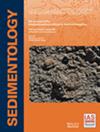Enhanced mud retention as an autogenic mechanism for sustained delta growth: Insight from records of the Lafourche subdelta of the Mississippi River
IF 2.8
2区 地球科学
Q1 GEOLOGY
引用次数: 0
Abstract
Mud deposition is acknowledged as a significant contributor to delta architecture, yet its role is often oversimplified as a constant parameter in models of delta formation. A better understanding of mud retention on deltas would resolve remaining questions regarding delta growth. This study explores how spatiotemporally varied mud retention facilitates sustained delta growth in defiance of the concept of autoretreat, that is, the idea that shoreline progradation rates decline as a delta grows due to the expansion of subaqueous and subaerial delta surfaces. This research is inspired by prior field observations of the river‐dominated Mississippi Delta, USA, where the shoreline of a加强泥浆滞留是三角洲持续增长的自生机制:密西西比河拉弗什三角洲记录的启示
泥浆沉积被认为是造成三角洲结构的一个重要因素,但在三角洲形成模型中,泥浆沉积往往被过分简化为一个恒定参数。更好地理解三角洲上的泥浆滞留将解决有关三角洲生长的其余问题。本研究探讨了不同时空的淤泥滞留如何促进三角洲的持续增长,这与 "自恢复"(autoretreat)的概念背道而驰,"自恢复 "的概念是指随着三角洲的增长,水下和陆下三角洲表面的扩张会导致海岸线后退率下降。这项研究的灵感来自于之前对美国密西西比三角洲以河流为主的实地观测,在该三角洲,尽管三角洲表面不断扩大,出现了压实和海平面上升现象,但面积约 6000 至 8000 平方公里的次级三角洲的海岸线在大约一千年的时间里以恒定的速度向前推进。为此,我们利用横向平均一维数值模型来验证以下假设:随着时间的推移,三角洲底层和三角洲平原(冲积平原)的淤泥滞留能力增强,从而支持成熟三角洲海岸线以恒定的速度向前推进。研究结果表明,在三角洲底盘和三角洲平原加强泥浆滞留有利于三角洲的持续发展。这两个部分本身都无法复制案例研究。然而,综合这两个部分,模型再现了在密西西比三角洲观察到的横截面和线性增长模式。研究结果为三角洲的持续增长提供了一种自生机制,并证明了淤泥作为三角洲基本组成部分的重要性,应将其纳入工程引河的三角洲增长模型中。
本文章由计算机程序翻译,如有差异,请以英文原文为准。
求助全文
约1分钟内获得全文
求助全文
来源期刊

Sedimentology
地学-地质学
CiteScore
8.20
自引率
11.40%
发文量
94
审稿时长
6-12 weeks
期刊介绍:
The international leader in its field, Sedimentology publishes ground-breaking research from across the spectrum of sedimentology, sedimentary geology and sedimentary geochemistry.
Areas covered include: experimental and theoretical grain transport; sediment fluxes; modern and ancient sedimentary environments; sequence stratigraphy sediment-organism interaction; palaeosoils; diagenesis; stable isotope geochemistry; environmental sedimentology
 求助内容:
求助内容: 应助结果提醒方式:
应助结果提醒方式:


